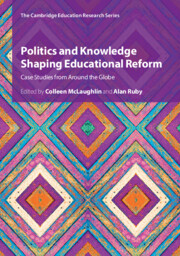Book contents
- Politics and Knowledge Shaping Educational Reform
- Politics and Knowledge Shaping Educational Reform
- Copyright page
- Contents
- Figures and Tables
- Contributors
- Preface
- 1 Introduction
- 2 Radical Curriculum Change and the Politics of ‘Implementation’
- 3 Towards a Play-Based Pedagogy in Ghanaian Kindergarten Education
- 4 Implementing Fee-Free Education in Rwanda
- 5 Policy Implementation in a Sisyphean State
- 6 Reforming the School System
- 7 Educational Reform in Scotland
- 8 The Role of Textbooks in Improving Education in Portugal
- 9 Turning Social Capital into a Working Wage
- 10 High-Performance and Equity
- 11 Missing Opportunity?
- 12 Conclusion
- Index
- References
5 - Policy Implementation in a Sisyphean State
Improving Pedagogical Practice in Perú through the Soporte Pedagógico Programme
Published online by Cambridge University Press: 06 February 2025
- Politics and Knowledge Shaping Educational Reform
- Politics and Knowledge Shaping Educational Reform
- Copyright page
- Contents
- Figures and Tables
- Contributors
- Preface
- 1 Introduction
- 2 Radical Curriculum Change and the Politics of ‘Implementation’
- 3 Towards a Play-Based Pedagogy in Ghanaian Kindergarten Education
- 4 Implementing Fee-Free Education in Rwanda
- 5 Policy Implementation in a Sisyphean State
- 6 Reforming the School System
- 7 Educational Reform in Scotland
- 8 The Role of Textbooks in Improving Education in Portugal
- 9 Turning Social Capital into a Working Wage
- 10 High-Performance and Equity
- 11 Missing Opportunity?
- 12 Conclusion
- Index
- References
Summary
The need to reform pedagogical practice in Peruvian schools has been on the country’s policy agenda at least since the mid-1990s. Since then, the country has undergone several attempts at reform through curriculum change and various in-service training attempts that relied on top-down implementation models and achieved only partial changes. In 2013, an innovative programme named Soporte Pedagogico (SP) devised a strategy to work on changes from within schools and intervening in several key areas at once. It combined teacher mentoring with training workshops, strategies to strengthen a school’s pedagogical leadership, remedial strategies for students lagging behind and parental involvement for improving learning. In sum, an integral approach to reform pedagogical practice. While implementation and impact evaluations showed great promise in the programme, the Ministry of Education introduced cuts and later dismantled the programme. The story of SP is illustrative of how the political economy of education policy making and reform operates in contexts described as Sysiphean states, whose weak institutions give rise to often erratic policy making processes. The case of SP also speaks about how competing visions of education – technocratic versus pedagogically minded – might clash and work against promising change strategies.
- Type
- Chapter
- Information
- Politics and Knowledge Shaping Educational ReformCase Studies from Around the Globe, pp. 58 - 78Publisher: Cambridge University PressPrint publication year: 2025

